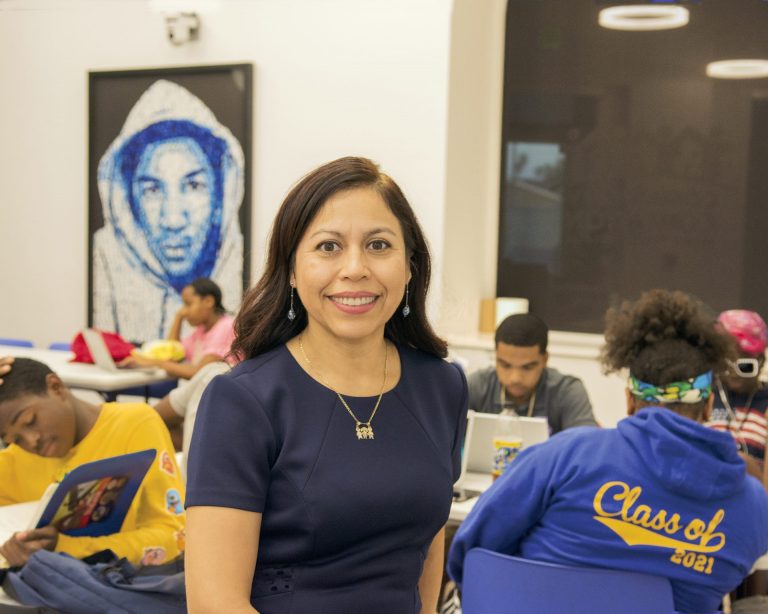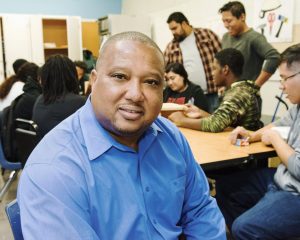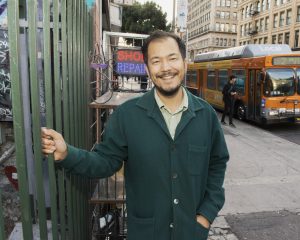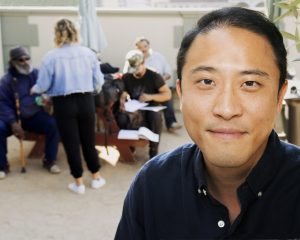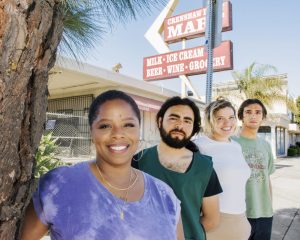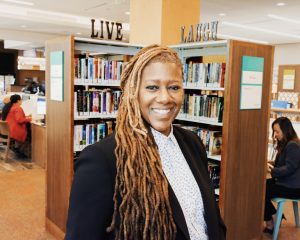Aurea Montes-Rodriguez is the former Executive Vice President of Community Coalition, an organization which she served for more than 20 years. Born in Mexico and raised in South Los Angeles, she developed a passion for building African American and Latino leadership, capacity, and strategies that are inclusive and effective toward community transformation. Her inquiry explored strategies for investing in emerging women-of-color leaders rooted in organizing and movement work. She seeks to find new, effective community approaches to nurture and cultivate the leadership of young women of color.
* Aurea transitioned out of her role at the Community Coalition in 2024.
Fellowship Summary
The Challenge: I dedicate my Stanton Fellowship to four women who are no longer with us but who encouraged me to pursue the fellowship and graciously guided my early learning—Dr. Beatriz “Bea” Solis (2020), Linda Gomez Evans (2022), Debra Lee (2022), and Sylvia Hull (2022). Part of their legacy is an inclusive gender equity lens and the collective leadership they modeled that became a recurring highlight in dozens of conversations with women leaders.
My inquiry was largely informed by my experience in senior leadership at Community Coalition (CoCo). When I received the Stanton Award, I had recently assumed the responsibility for launching a Center for Community Organizing (CCO) to expand power-building capacity in BIPOC communities across the country. As a 30+ year organization, CoCo had developed significant organizing capacity and had decades of multiracial solidarity experience to inform the strategies and programs of the CCO. However, I was concerned that we did not have a plan to effectively support the upcoming generations of women-of-color organizers. For the broader social justice sector, I also worried that gender equity was an intractable problem and that the lack of investment in addressing gender specific needs of emerging organizers was creating inordinate stress and limiting future opportunities for long-term leadership roles.
The Proposal: I began my inquiry by looking at the social justice sector to explore strategies for investing in emerging women-of-color leaders, centered on organizing and movement work. My sight was set on finding new, effective community approaches to nurture and cultivate the leadership of young women of color. I focused on two categories of emerging leaders: female-identifying organizers (aged 16-30) and women who are new to or growing in leadership roles within organizing or movement workspaces.
The Stanton Journey: Early on, a deep dive into feminist theory and an advisory meeting with South LA community women leaders from CoCo’s Kinship In Action (KIA) program shaped my inquiry. What I found in my research is that for many decades, Black women have had inclusive and expansive gender analyses that include a critique of capitalism, white supremacy, and patriarchy. These theories acknowledge the US’s history and culture of violence, exploitation, and division, while also exploring terms and evolving definitions such as third-world feminism, womanism, Black matriarchy, sexuality, and non-binary and gender-expansive frameworks.
One week before the global COVID-19 pandemic resulted in a complete shutdown, KIA leaders insisted on keeping our scheduled lunch to discuss my Stanton project. These women had led a decades-long fight to keep their relative children in “Family Care, Not Foster Care!” (the name of their campaign). The leaders were energized by my inquiry and voiced that they wanted to actively support my learning. Unfortunately, the two-week shutdown turned into a more-than-yearlong closure. Women and elders were disproportionately devastated due to their caretaking and financial obligations, housing situations, health, and age.
Nothing could have prepared me for the leadership challenges that women would confront. Nationally, the reversal of Roe v. Wade was a gutting backlash against women’s constitutional rights to safe and legal abortions. This decision came soon after Kamala Harris made history as the US’s first Asian Black woman Vice President. The attacks and threats appeared to be a central tactic of America’s right-wing white nationalists, and the Left did not have a proper response. The beloved Patrisse Cullors, prominent Co-Founder and face of the Movement for Black Lives, pushed forward and led a global response following the devastating killing of George Floyd. The country reached an inflection point, and Opal Tometi, Alicia Garza, and Patrisse made great sacrifices to advance a Black liberation movement informed by their decades of experience in organizing and over a decade of building the BLM Global Network after the murder of Trayvon Martin.
My Stanton Fellowship also opened many doors into women-led organizations with similar gender justice values. The organizations are proactively investing in the development of women organizers but also identified a need for more spaces that are welcoming to mothers and young or inexperienced organizers—spaces where women can feel safe and be themselves, discuss issues, problems, and developmental needs, and receive support when moving into new leadership roles.
The generous reception of all the women I met in California and beyond was inspiring. They welcomed me into their homes and organizations, brought other women with them, introduced me to other leaders in other cities, and formed new groups to support my inquiry with the hope that together we could build a future that fully values and includes women and girls.
A Wisdom Braintrust of four women including myself came together in 2021. We were in search of new ways to build communities grounded in sisterhood. We radically imagined women to be in centered leadership roles informed by cultural healing practices and generative frames of abundance, mutuality, embodied feminine wisdom, and community.
Along with three other Black and brown women, as well as CoCo’s CEO, we formed a Make LA Whole (MLAW) coalition to explicitly call for greater investments in the LA City budget for women, families, and overpoliced communities disproportionately impacted by the COVID-19 pandemic. We won a historic $170 million allocation, and today the MLAW coalition has grown to include SEIU Local 99, Black Women for Wellness, and Catalyst California.
Connie Chung Joe, the Chief Executive Officer of Asian Americans Advancing Justice (ASOCAL), convened with a group of women leaders—now called Sisterhood Trust—representing six social justice organizations: ASOCAL, Brotherhood Crusade, CoCo, Khmer Girls in Action, CARECEN, and Translatina Coalition. Our group is exploring sustainable care practices, nurturing the leadership of emerging BIPOC and LGBTQA+ women leaders, and is committed to speak out on civil rights issues impacting women.
Where I Am Now: Lastly, thanks to former Supervisor Sheila Kuehl, CCO is leading a community-organizing fellowship for women and girls. Coming full circle, I was able to honor KIA leaders by naming the fellowship after beloved unsung hero, Debra Lee. The Debra Lee Women’s Organizing Fellowship is composed of emerging organizers who identify as BIPOC, non-binary, gender expansive, and women, all of whom are committed to transforming social and economic conditions, advancing equity, and expanding opportunities for BIPOC communities. My hope is that any new practices that emerge from the fellowship will contribute to more healing approaches that can improve the health and sustainability of future generations of women organizers and movement leaders.
